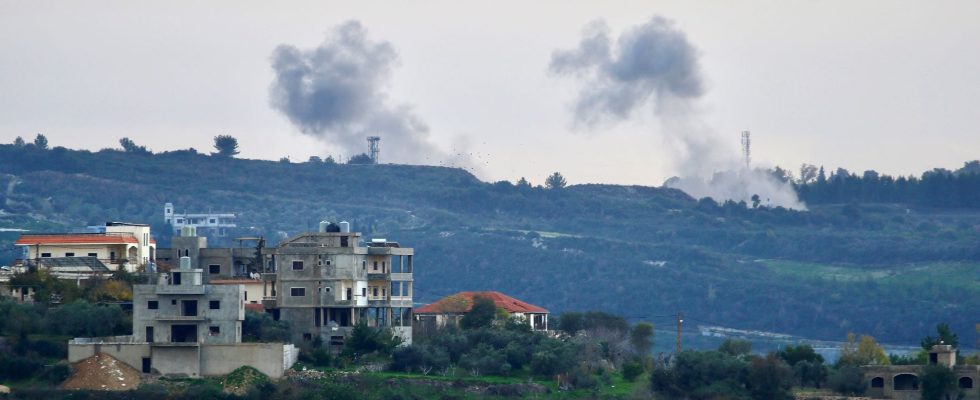As promised, Hezbollah is fighting back. After the assassination of Hamas number 2 on Wednesday January 3 in a Hezbollah base in Beirut, Lebanon, the pro-Iranian Islamist movement fired more than 40 rockets into northern Israel this Saturday January 6. The UN has denounced a Gaza Strip that has become entirely “uninhabitable”, while strikes continue to cause deaths in the center and in Rafah, where civilians are massing.
Information to remember
⇒ Hezbollah says it bombed a military base in northern Israel in retaliation for the elimination of Hamas number 2 on its territory
⇒ Israeli strikes continue to cause deaths in Gaza and Rafah
⇒ France and Jordan dropped 7 tons of humanitarian aid by air
Base in northern Israel bombed by Lebanese Hezbollah
Lebanese Hezbollah claimed to have fired dozens of rockets this Saturday, January 6, towards a military base in northern Israel. According to the Lebanese Islamist organization, this attack is its first response to the January 3 elimination of Hamas number two, Saleh al-Arouri, and six other Hamas officials and executives, in the stronghold of the southern suburbs of Beirut of Hezbollah.
According to the Israeli army, around forty rockets were fired this Saturday morning towards the Meron region from neighboring Lebanon. Israeli forces responded by striking a cell responsible for some of these shootings in Lebanon. Since October 8, Hezbollah has launched daily attacks — often against Israeli military positions near the border — from southern Lebanon, in support of Hamas, its ally. And Israel responds by bombing targets in southern Lebanon.
Friday January 5, Hezbollah leader Hassan Nasrallah affirmed that Tuesday’s strike on his stronghold “is serious and would not go unanswered.” “The response is inevitable” and the movement will “respond” on “the battlefield”, he warned. The violence left 175 dead in Lebanon, including 129 Hezbollah fighters but also more than 20 civilians, according to an AFP count.
New strikes in Rafah, Gaza becomes “uninhabitable”
The Gaza Strip has become “uninhabitable”, the UN warned once again on Friday January 5, three months after the start of a war whose outcome everyone is struggling to envisage. Its inhabitants “face daily threats before the eyes of the world”, declared its humanitarian coordinator, Martin Griffiths, in a press release.
Israeli strikes also sounded early this Saturday in Rafah, a town at the southern tip of the Gaza Strip where hundreds of thousands of Palestinians have taken refuge in recent weeks trying to escape the clashes. On Friday, hospital sources reported 35 deaths in Deir al-Balah (center), where the Israeli army announced the “elimination” of “terrorists”. In the north of Gaza the bombings also continue.
A post-war plan in the middle of a war?
Despite the absence of prospects for a cessation of hostilities, Israeli Defense Minister Yoav Gallant unveiled ideas for the post-war period on Thursday, on the eve of the start of a regional tour by the head of diplomacy American Antony Blinken. The plan presented by the minister must still receive the approval of a divided government. It provides for the continuation of operations in Gaza until “the return of the hostages”, the “dismantling of Hamas’ military and governance capabilities” and the “elimination of military threats”.
France and Jordan drop 7 tonnes of aid on Gaza
France and Jordan have dropped seven tons of humanitarian and health aid on the Gaza Strip, where the approximately 2.4 million inhabitants lack all the essential foodstuffs to live, French President Emmanuel Macron announced on Friday. According to the Elysée, the drop operation was carried out during the night from Thursday to Friday by two C-130s, military transport planes, one French and the other Jordanian, “with mixed teams both Jordanian and French in both aircraft. The aid was “successfully” dropped near the Jordanian field hospital on the strip.
The war has caused immense destruction and a humanitarian disaster in the Palestinian territory, where famine threatens and most hospitals are out of service. Residents of the Gaza Strip – 85% of whom have been displaced according to the UN – face severe shortages of food, water, fuel and medicine. Despite a UN Security Council resolution demanding the delivery of humanitarian aid, aid trucks are still only arriving in trickles.
